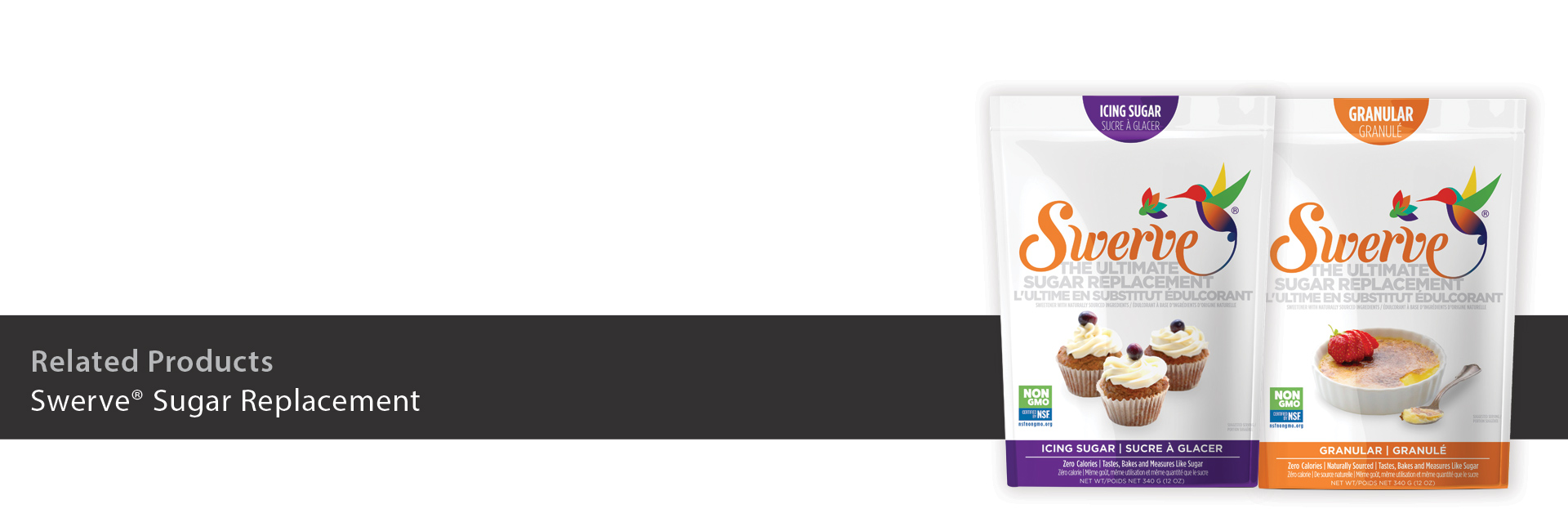

What Makes a Sweetener Keto-Friendly?
With everyone recognizing that excess sugar isn’t great for you, keto and other low carb diets have officially hit the big time. For a lot of people, that makes for big changes to how they eat, and that can be tough. Swerve’s mission is to make those changes a little easier. After all, life is for living.
So what factors do people eating keto typically look for in a sweetener?
- Low carb,
- Natural,
- Non-glycemic, and
- Delicious
Be in Control of Your Carbs
Depending on the path you choose, your dietary carbohydrate needs will vary. But the one constant is that Swerve allows you to be in control of your carbs – both with our Sweeteners and our Sweets bake mixes. If you’re keto and really trying to get those sugars as low as possible, sweeteners like Swerve can help you cut added sugar entirely. And with low-net-carb bake mixes, you can keep things tasty and simple while still hitting your macros.
As for natural foods, it isn’t just ketovangelists that have hopped on the train. A healthy skepticism of what impact artificial sweeteners might have on your body has become fairly common, and many keto and low-carb eaters are no exception. With ingredients derived entirely from fruits and vegetables, you don’t need to worry about what’s in Swerve.
Balanced Blood Sugar Benefits
One of the major benefits of keto and other low carb diets is ensuring that your blood sugar doesn’t spike when you eat. And whether you’re trying to stay in ketosis or just cutting down on breads, pastas, and desserts, keeping your blood sugar in check is a great way to feel better on a daily basis. In addition to avoiding the after-lunch slump, blood sugar regulation has long-term impacts on your metabolism and the way your body ages.
But maybe the most important factor is that a sweetener has to be just plain delicious. To be consistent about the way you eat, it just has to taste good. And that’s where Swerve can help. Swerve tastes, measures, and bakes just like sugar, so your keto, carb-conscious, or just-a-little-less-sugar-filled treats still taste like a treat!
Artificial sweeteners, commonly called high-intensity sweeteners because they can be up to 600 times as sweet as sugar, are man-made and can be found in packets, diet sodas, yogurts, snack foods, protein bars, protein powders, meal replacement drinks, candy, and even products like toothpaste and gum. Because of the intense sweetness, they aren’t ideal for baking and cooking.
Some common examples include:
- Aspartame (Equal) – 200x sweeter than sugar
- Ace-K (Sunett, Sweet One) – 200x sweeter than sugar
- Sucralose (Splenda) – 600x sweeter than sugar
- Saccharin (Sweet-n-low) – 200-700x sweeter than sugar
Health Effects
Artificial sweeteners have been vigorously studied over the years for their relationship to the obesity problem in North America.
The Good:
- They are approved by the FDA (Food and Drug Administration) and are generally recognized as safe.
- They can play a role in preventing tooth decay by replacing the sugar that promotes cavities.
- Because they have zero calories, artificial sweeteners don’t directly contribute to weight gain and may even be helpful for weight loss. Artificial sweeteners may even help manage diabetes since they have little to no effect on blood sugar and insulin.
- Finally, they are inexpensive and easy for most people to find.
The Not-So-Good:
- Studies show that artificial sweeteners may potentially increase your risk of weight gain, obesity, metabolic syndrome, and Type 2 Diabetes.
- Another concern with these high-intensity artificial sweeteners is that they may de-sensitize tastebuds. As a result, people may be less able to detect the subtle sweetness in fruits and vegetables, leading to lowered consumption of these very nutritious foods.
- Some studies also suggest that artificial sweeteners might increase sweet cravings and may even become addictive.
- Finally, certain artificial sweeteners may impact the gut microbiome, which is intricately connected to many metabolic processes, including insulin sensitivity.
The Bottom Line
Artificial sweeteners may help people maintain a healthy weight or even lose weight. And they can be a part of a healthy diet in moderation. However, there is a great deal of concerning research about the widespread use of artificial sweeteners at home and in food products. Until there is more research on how artificial sweeteners affect the body, we prefer to stick with natural sweeteners like Swerve.
Want to start baking with a natural sweetener? Check out these Old Fashioned Peanut Butter Cookies using Swerve.


Ingredients
1/2 cup of unsalted butter, softened to room temperature
1/3 cup Swerve Granular
1/3 cup of Brown Swerve
1 large egg (room temperature)
1 teaspoon of vanilla extract
1 ¼ cup of unsweetened creamy or chunky peanut butter
3/4 cup of almond flour
1/4 cup of coconut flour
½ teaspoon of baking soda
½ teaspoon of baking powder
¼ teaspoon of salt
¼ cup Swerve granular for rolling
Directions
- Preheat oven to 350°F and line two cookie sheets with parchment paper.
- With a mixer, cream softened butter and Swerve (brown and granular) until smooth. Add the egg and mix on high until combined. Scrape down the sides of the bowl as needed. Add vanilla and peanut butter and mix on high until combined.
- In a separate bowl, combine flour, baking soda, baking powder, and salt. Add to the wet ingredients and mix on low until combined. Dough will be firm and sticky. You can chill the dough for three hours to help rollability or roll immediately.
- Roll 1 Tbsp of dough into a ball and then roll in Swerve Granular. Place on a cookie sheet and then press down with a fork (crisscross design) to form the signature peanut butter cookie design (like a tic-tac-toe board). Place in oven and bake for 10-12 minutes or until lightly browned on the sides. The middle will look soft and undone. Remove from the oven and let cool on the baking sheet for 5 minutes before transferring to a wire rack to cool completely.
- Serve immediately, or they can be stored covered at room temperature for 5 days.
Makes 24 servings

